Next Tuesday is September 1. Get your party hats out! Get ready to pop open the champagne, and stay up till midnight, and see the New Year in!
Or not.
For any who haven’t the faintest idea what I’m talking about: Eastern Orthodox ecclesiastical New Year is September 1. But even Orthodox will think I’m out of my mind, because:
1 Orthodox have never paid much attention to September 1. Why not? Here’s my guess. From the time of Caesar Augustus September 1 had been the Indiction (“fixing”, “ordering”) when taxes were fixed for the next fifteen years, and Emperor Constantine the Great never changed it. So… how many of us in the US feel like celebrating on April 15? Sometimes at Saint Nicholas, when a regular service fell on September 1, I’d bring some champagne. People thought I was nuts.
2 Besides that, the Orthodox Church’s day begins at sunset, not midnight. “There was evening and there was morning, the first day.” Genesis 1:5. So here in Milwaukee this year we only need to stay up till 7:25 p.m. to see the New Year in. At my advanced age I like that!
The New Year
I’m sure you realize that the date for the New Year is completely arbitrary. Nothing in nature fixes when we begin it. Various cultures and religions have celebrated it at different times.
In the pagan Roman Empire January 1 was dedicated to Janus who faced in two directions, the god of endings and beginnings, and that was their New Year’s Day – as it still is in Western society. My Antiochian Archdiocese’s Liturgikon provides prayers both for January 1 and September 1. (If you think I’m going to get into Old Calendar/New Calendar stuff here, forget it.)
Most cultures and religions have their own New Year’s Days, though January 1 is taking over everywhere. Despite the varying dates of Chinese New Year, Shanghai has a great fireworks display on January 1. Western Liturgical New Year is the first Sunday of Advent. In some places during the Middle Ages Western Christians celebrated it on March 25. (Can you guess why? Comment below.)
While we’re on the subject, did you ever consider that Nature, as given by God, requires the length of the year and of day and night – but not that days be divided into 24 hours, or that there be a seven day week, or that the year be divided into four seasons. (Try not to imagine 13 hour days or hours with 73 minutes. 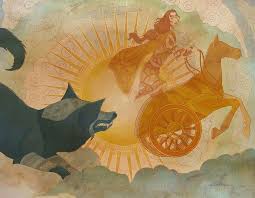 It will only disorient you.) Nor must our days be named after Norse gods, of all people – Sunna’sday (here Sunna goddess of the sun, being chased by darkness), Mani’sday, Woden’sday, Thor’sday and so on. A bit “pagan”, you say? Oh, I wish we could be like the Greeks and begin the week with Kyriake/κυριακή, the “Lord’s Day”. Should we start a movement?
It will only disorient you.) Nor must our days be named after Norse gods, of all people – Sunna’sday (here Sunna goddess of the sun, being chased by darkness), Mani’sday, Woden’sday, Thor’sday and so on. A bit “pagan”, you say? Oh, I wish we could be like the Greeks and begin the week with Kyriake/κυριακή, the “Lord’s Day”. Should we start a movement?
We’re wandering. Back to the topic:
September 1: Beginnings
How did September 1 become Orthodox ecclesiastical New Year? Like most things Orthodox, we inherited it from the Old Testament Jews. Jewish New Year, Rosh Hashanah, falls at varying times during September, based on a lunar calendar. They calculate that this year is the 5780th since Creation. This in Hebrew is לבריאת העולם, “of the creation of the world”, or in Latin Anno Mundi, “the year of the world”. Why September? This is harvest time, when preparations for the winter and the following year began. Note the same pattern: “The evening” of the old year begins “the morning” of the new year.
The Jews also believe that at this time they entered the Holy Land, after their Exodus from Egypt, the beginning of their life in the “land of milk and honey”.
Fittingly, Orthodox Christians celebrate some Old Testament saints on this day: Joshua, the son of Nun, successor to Moses, who led the Hebrews into the Promised Land, and  the Maccabean martyrs – a story from Second Maccabees, chapter 7. (If we have Protestants here present: This is one of the books which most Protestant Bibles omit, though some place it in a section called the Apocrypha. Look it up for yourselves, guys. It’s a good story.)
the Maccabean martyrs – a story from Second Maccabees, chapter 7. (If we have Protestants here present: This is one of the books which most Protestant Bibles omit, though some place it in a section called the Apocrypha. Look it up for yourselves, guys. It’s a good story.)
In the Sixth Century a Scythian monk Dionysios first calculated the date of Jesus’ birth, the coming of the New Creation, after which years began to be designated AD (Anno Domini, the year of our Lord). His numbering was apparently off about five years, but let’s not go into that. Ecumenical Patriarch Theophanes I Karyes adopted this dating in 1597, though it never became regular practice in Constantinople till 1728, and in Russia till 1700. Western Christians had long before begun dating AD and BC. They say this began under Charlemagine in the Eighth Century. Do we need to hear more about this now? No.
Please note that modern secularists who designate dates as CE (Common Era) are still counting years from the birth of Christ, whether they like it or not.
Orthodox tradition holds that on September 1 our Lord Jesus Christ taught at the synagog in Nazareth, quoted a Messianic prophecy from Isaiah, and then concluded (shockingly) “Today this Scripture 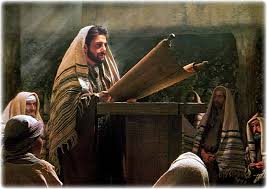 is fulfilled in your hearing.” Luke 4:18-21 This was the beginning of His public Messianic ministry, and the foreshadowing of what it would lead to. “No way! Who does He think He is? We knew Him as a boy!” and they drove Him out of town and tried to throw Him over a cliff.
is fulfilled in your hearing.” Luke 4:18-21 This was the beginning of His public Messianic ministry, and the foreshadowing of what it would lead to. “No way! Who does He think He is? We knew Him as a boy!” and they drove Him out of town and tried to throw Him over a cliff.
To take the theme farther, the first Great Feast of the Orthodox year is September 8, the Nativity of the Theotokos, which begins the story our salvation history in Jesus Christ. How neatly this fits in. Whether anyone but the Holy Spirit planned it, who can say?
The hymns for September 1 sum up many of these themes:
Troparion/Apolytikion O Creator of the universe, who set times and seasons by Your own authority, bless the cycle of the year of Your grace, O Lord, guarding our rulers and Your commonwealth in peace, at the intercession of the Theotokos, and save us.
Kontakion You who created all things in Your infinite wisdom, and set the times by Your own authority, grant Your Christian people victories. Bless our comings and goings throughout this year, and guide our works according to Your divine will.
September 1: Our Environmental Responsibility
Something very obvious flows out of the Creation story, and I want to spend some time on this (as I have before) because we don’t seem to hear much about it in American Orthodoxy these days. 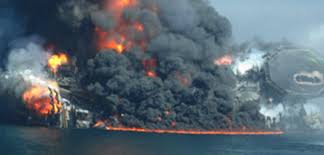 Too hot to handle? How ever did this become a controversial political issue? It wasn’t always. Serious modern environmental protection in America began under Republican President Richard Nixon in 1970. The movement “caught fire” about the time the Cuyahoga River in Cleveland literally caught fire! above
Too hot to handle? How ever did this become a controversial political issue? It wasn’t always. Serious modern environmental protection in America began under Republican President Richard Nixon in 1970. The movement “caught fire” about the time the Cuyahoga River in Cleveland literally caught fire! above
This is not a political matter. It’s scientific. And theological.
The theology: God the Holy Trinity (note the plural here) “said, ‘Let us make man [generic male and female, of course] in our image, according to our likeness; and let them have dominion over the fish of the sea, and over the birds of the air, and over all the wild animals of the earth, and over every creeping thing that creeps upon the earth.'” Genesis 1:26 No matter how we understand the early stories of Genesis, the theological point is clear: God gives mankind supremacy, authority, primacy – “dominion” on earth.
This is self-evident. These days some say that we humans are only “part of nature”. Wrong. Our dominion over nature is obvious. For example: We take our dogs for a walk. Our dogs do not take us for walks! (Well, except for a Saint Bernard I once knew.) With dominion always comes responsibility. When our dogs are ill, we don’t just watch them die. We take them to the vet and do whatever we can to heal them. We do for them what they can’t do for themselves. And certainly we do not do things which make them ill.
The same with our dominion over the world around us. Dominion does not mean thoughtless domination. We don’t do things to “sicken” our natural environment. And when the world is ailing, we must do what we can to heal it. “God will take care of it” doesn’t work any more with our environment than it does with our dogs.
That is why in 1989 His Holiness Ecumenical Patriarch Demetrios of Constantinople issued an encyclical on the environment, calling on all Orthodox Christians to pray for and protect this world. He also established September 1 as “a day of prayer for the protection of the environment”, something adopted soon after by the rest of the canonical Orthodox churches. (The Vatican also followed suit.)
Ecumenical Patriarch Bartholomew
“One of the 100 Most Influential People in the World Today” Time Magazine
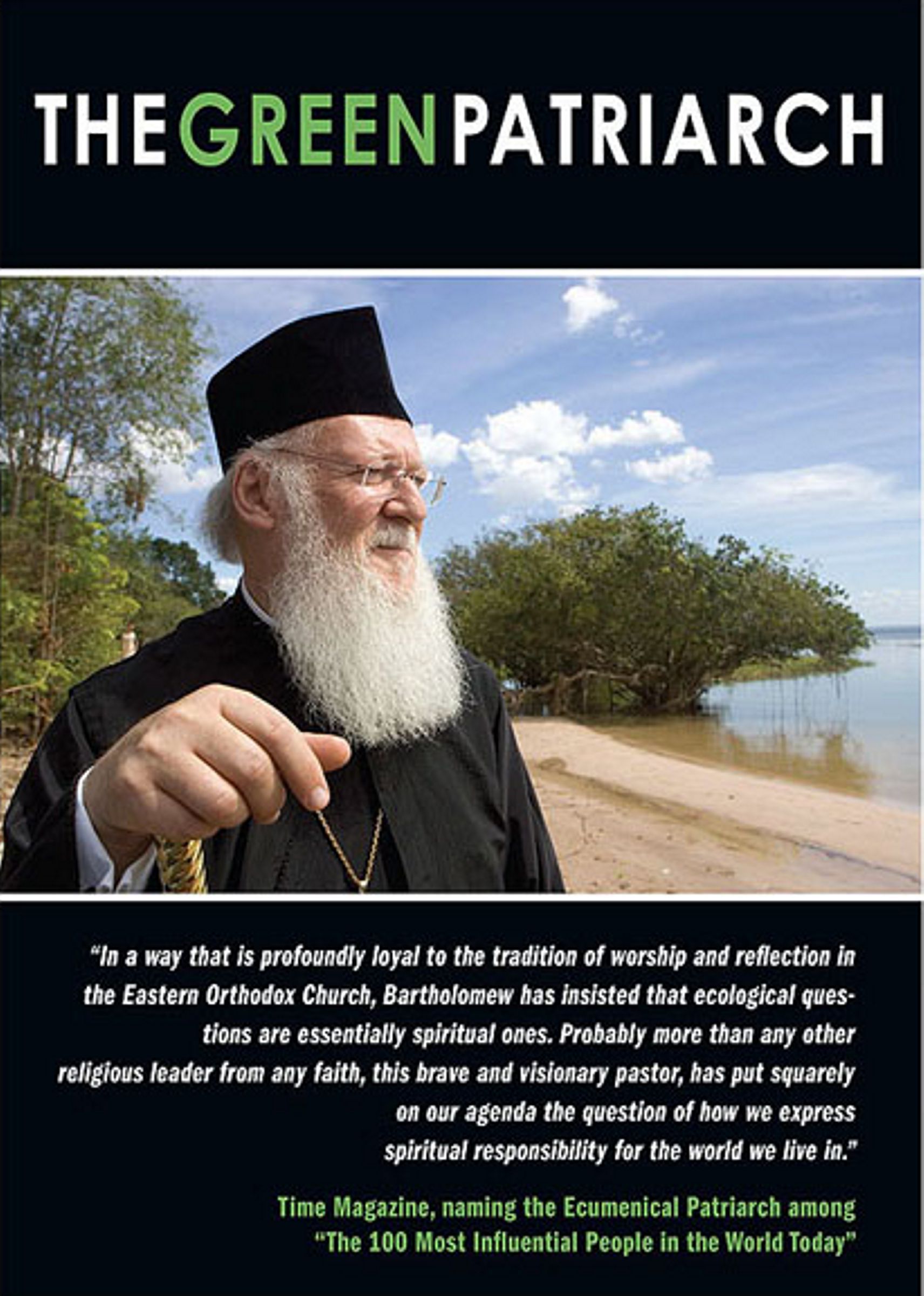
Since his elevation as Ecumenical Patriarch in 1991, His Holiness Bartholomew has issued an encyclical each September 1 on various aspects of environmental protection. This is his special concern. He has become affectionately known as “the Green Patriarch,” and he often speaks all over the world on the subject.
Please don’t misunderstand. Patriarch Bartholomew is not favoring any particular American political group. We Americans can so easily assume the whole world thinks in our categories. It does not. Political parties in other places do not neatly parallel our American political categories. Also in most countries, there is little argument about the need to rescue our environment, or about the reality of global warming, for that matter.
Nor is the Patriarch insisting on a particular understanding about the cause of climate change. His point is simply that Christians have a God-given responsibility to do all we can to protect the environment, and alleviate the human suffering environmental irresponsibility causes. He wants September to be a time for us Orthodox to learn about this and do what we can about it.
Here’s a good article on his work: https://www.patriarchate.org/the-green-patriarch
Many Orthodox authorities have issued statements asking for environmental responsibility – including SCOBA (the Standing Conference of Canonical Orthodox Bishops in America – now titled The Assembly of Canonical Orthodox Bishops of the United States of America), the Russian Orthodox Church, and a little searching will turn up many more. This is not a controversial topic in the Orthodox Church.
For any non-Orthodox readers who don’t understand the place of the Ecumenical Patriarch in Orthodoxy, there’s an addendum way down below.
A few words on the Environment from Patriarch Bartholomew:
“Orthodoxy is committed to ecology; it is the “green” Church par excellence. Our faith and our worship strengthen our commitment to the protection of creation and promote the “eucharistic use” of the world, the solidarity with creation. The Orthodox Christian attitude is the opposite of the instrumentalisation and exploitation of the world.”
“We believe that the roots of the environmental crisis are not primarily economic or political, nor technological, but profoundly and essentially religious, spiritual and moral. This is because it is a crisis about and within the human heart.”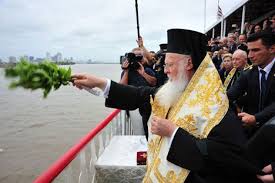
Blessing of waters at Epiphany
“This world is not just a gift from God; it is a challenge for humanity. We have at last come to learn the truth that we have mistreated the natural environment and its resources. The consequences are plain and painful. They are evident in the air that we breathe, the water that we drink, the food that we consume, the emotional and physical problems that we face in our health, but also in our relationships with each other on the local, regional, national and global levels.”
“A society that ignores the mandate to care for all human beings is a society that mistreats the very creation of God.”
“As greed overcomes our communities, consumption increases beyond what the earth can possibly sustain. In other words, the greedy ravage more resources than the earth can ever renew. Possessing the earth in such a selfish way deprives it of its life-giving properties and poses a great threat to the rest of creation.”
“Global warming is a moral crisis and a moral challenge.”
“The way we respond to the natural environment directly reflects the way we treat human beings. The willingness to exploit the environment is revealed in the willingness to permit avoidable human suffering. So the survival of the natural environment is also the survival of ourselves. When we will understand that a crime against nature is a crime against ourselves and sin against God?”
____________________________________________________________________________
So, what should we bring out for Orthodox New Year? Champagne? No, four other things: 1 Great gratitude to God for His mercies to us. 2 Much prayer for the coming year – especially that it be a better year than 2020. 3 Our consciences. 4 Repentance, not only for our sins against those near us, but against the world around us and against the future of all coming generations.
Next Two Weeks: begin Four Days on Mount Athos
Addendum: The Place of the Ecumenical Patriarch
The Ecumenical Patriarch is not the “Orthodox Pope”. Rather he is “chief among equals” of Orthodox bishops. Only a small minority of Orthodox are under his jurisdiction, and in any event no one is required to agree with him about everything without question. However, we all owe him respect and attention – as with all our own Patriarchs and Metropolitans. And we owe him our sympathy and prayers, living as he does in Turkey in an atmosphere that is increasingly actively hostile to Christians – the very few Christians who remain there. He nevertheless carries on a vigorous ministry to the world, and speaks to and for the Orthodox Church on many issues. I’m impressed by the man.
Of course, no individual, not even the Church Fathers, understands all things. So other Orthodox bishops and teachers, sometimes with equal vehemence, fill in teachings which Patriarch Bartholomew misses or fails to emphasize. No problem. No one in the Orthodox Church is infallible.
Here is the website for the Ecumenical Patriarchate: https://www.patriarchate.org/
Here is CBS-TV’s “Sixty Minutes” interview with him. https://www.youtube.com/watch?v=K6ZXxgjKk2o
Next Week: begin Four Days on the Holy Mountain
Happy New Year, Father Bill Olnhausen! And thank you for this blog entry, it’s a very interesting read. I was glad to learn that Orthodox Church embraces enviromental stewardship and thank you for introducing us to “Green Patriarch”, Bartholomew. Environmental issues were always close to my heart, as well as Orthodox religion and it feels right that somebody is addressing this issue in a non-political context, as it should be. Our everyday actions make a lot of difference, but without the global awareness and the many corporations taking notice and responsibility, we can’t stop the desruction of our Mother Earth (as we call it in the Eastern European tradition). Thanks again and wishing you good health for many years!